Penn State Community Not-So-Silently Sprung to Attend Marathon Read Event Focused on Sustainability
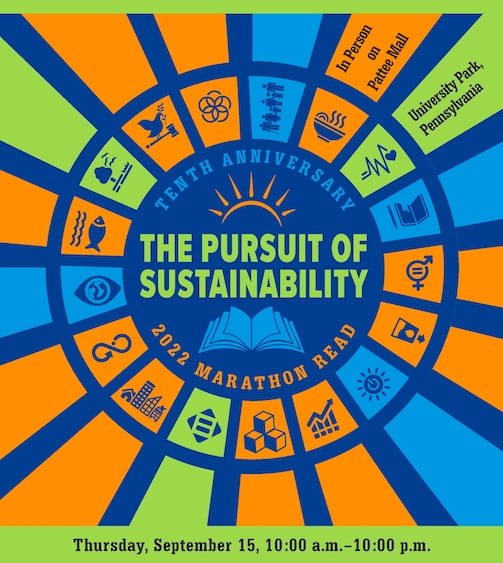
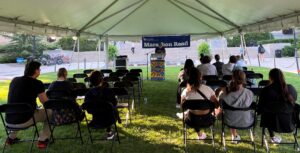
Penn State students and faculty united on the Pattee Mall on Sept. 15, taking the opportunity to appreciate sustainability-themed literature and consider the environmental implications of climate change, for the first in-person Marathon Read event since the coronavirus pandemic began.
This year marked not only a return to Marathon Read’s usual in-person format, but also its tenth anniversary.
The day began at 10 a.m. with Rachel Carson’s revolutionary 1962 Silent Spring, a foundational text in the environmental movement. Over the next 12 hours, community volunteers read from a variety of works by an array of literary masterminds, including K.A. Hays’s “Anthropocene Lullaby” and Ross Gay’s “Catalog of Unabashed Gratitude.”
Event organizers selected “The Pursuit of Sustainability” as this year’s theme. The readings were carefully curated to explore the “complex challenges of climate change and its effects on environments, economies, and cultures,” according to the 2022 Marathon Read poster that greeted event attendees.
Participants from Penn State and the larger Centre County community were invited to read for five-minute intervals. Special guests like philanthropist Sue Paterno and English department head Mark Morrisson also joined throughout the day to put a voice to the selected sustainability pieces.
Morrisson said he’s attended every Marathon Read event since 2012 when English professor Chris Reed and Comparative Literature professor Eric Hayot formed the initiative.
He explained he’s been supportive of the event since it started and sees Marathon Read as “a presence” on the lawn in front of the College of the Liberal Arts, English department, and library that positively promotes literature to the general community.
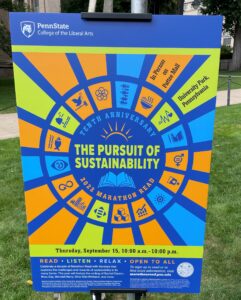
Joe Bueter, a Penn State professor of English and Marathon Read organizer, said the event is about putting “engaging texts,” which this year focused on the challenges and the rewards of sustainability, in front of the public.
“It was strange doing it two years over Zoom, so I was really happy with the possibility of doing it outdoors again where it does a better job of touching people during their day as they’re walking past and can stop, relax, and hopefully—ideally—just absorb a little bit of the literature we’re reading at the time,” Bueter shared.
With this year’s sustainability theme, Bueter commented it makes sense to hold the event in an outdoor environment so people can “see what we’re trying to preserve.” He said he hopes this year’s theme encourages students to consider how to incorporate sustainability efforts into their day-to-day lives.
Many students and community members participated in this year’s Marathon Read. Mara McKeon, a second-year English and public relations student, learned about the event through her social media internship with the Digital English Studios and was excited at the opportunity to volunteer and participate as a reader.
McKeon expressed enthusiasm for the sustainability theme, as climate change discourse has permeated all levels of society, especially in political and institutional spheres.
“I think it’s a good topic to bring to light, [especially] through the more lighthearted way of reading—not a [traditional] lecture setting,” McKeon added.
First-year finance student Luke Hamaty decided to volunteer for a one-hour shift at Marathon Read because he heard it would be an engaging community event and a great opportunity to get involved in his first semester at Penn State.
During his shift, Hamaty worked at the sign-in table helping readers prepare for their time slots and as a timer aiding with transitioning readers after their five minutes were up. His involvement with the event has provided him with a new perspective, he said, as well as insight into the ways he can serve the Penn State community.
Gabrielle Leach, co-chair for Penn State’s Student Sustainability Advisory Council and a third-year student majoring in environmental resource management, noted that events “rooted in science and literature” provide attendees with “a great stepping stone” to learn more about sustainability while also dispelling previous misinformation campaigns.
“There’s a place for everyone in the climate change movement, in sustainability, and in being environmental,” Leach said. “It doesn’t matter if you’re majoring in business or engineering or something in the liberal arts. Whatever you are, there’s always some facet of your degree that’s going to connect back to sustainability and the climate change movement.”
Alex Warren, a first-year student majoring in landscape architecture, decided to volunteer as a time keeper at Marathon Read because she’s deeply interested in sustainability and is trying to learn about the environment.
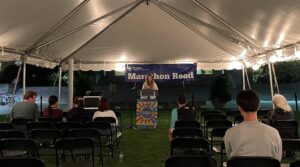
“I’m also dyslexic, so it’s a very good opportunity to see people read,” Warren explained. “I just like listening to the different voices as they read the same book.”
Sarah Corrigan, a second-year advertising student, read an excerpt from Rachel Carson’s Silent Spring during her time slot. She admitted she didn’t know what the event entailed when she signed up as a reader, but the experience pleasantly surprised her.
“When I showed up and saw that people were reading aloud, I got a little nervous, and I wasn’t sure if I was actually going to show up,” Corrigan commented. “But I decided to, and it was a really good [decision] because it’s important to have experience public speaking about something you’re passionate about, and I’m passionate about sustainability.”
Alysha Ulrich, co-chair for Penn State’s Student Sustainability Advisory Council and fourth-year earth science and policy student, suggested people should attend sustainability-themed events with the intention of learning about the topic, rather than trying to discern whether they believe in climate change and environmental matters.
She said events like Marathon Read are primarily educational in nature—not political—although mass participation in such events can sway decisions by institutions and policy makers.
“Trying to add to the voice and the momentum surrounding sustainability conversations is really important,” she remarked.
The Penn State College of the Liberal Arts designated “Moments of Change: Creating a Livable Planet” as their 2022-23 academic theme that would focus on sustainability and the efforts of the Liberal Arts Sustainability Council at the University Park campus. The 2022 Marathon Read is one component of the year-long initiative designed to start conversations about current and future sustainability needs.
Lara Fowler, the interim chief sustainability officer and director of the Penn State Sustainability Institute, said she supported the Marathon Read topic because it reframes the sustainability conversation amid a turbulent culture of environmental discourse.
Fowler said the environmentally focused narratives commonly distributed by mass media prompt people to adopt negative mindsets about the environment and climate. She explained how hearing misinformation and ill-framed news causes some people who would typically participate in sustainability action to feel helpless about their potential contributions.
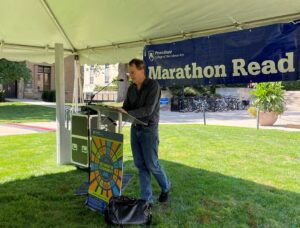
“The narrative needs to be one of hope, and ‘we are,’ and we can do this,” Fowler added. “We may feel like we’re just one state in a tiny microcosm of the whole world, but we’re important in terms of what we can do in that space we have. That’s where the energy, the drive, the motivation, and the engagement of students [is] important. That driving voice can be a driver for change here locally, but with that snowball effect in lots of other spaces.”
Fowler suggested people need to consider the “vision” for what they want their communities to be, and she sees literature as one way to envision those possibilities and pinpoint ways to transform dreams into reality.
“Books, literature, and writing allow us to transport ourselves out of the here and now and see a different world—to imagine a different world,” Fowler said. “There’s a tremendous power in telling stories because behind the scenes, there’s such good work happening locally, regionally across Appalachia, nationally and even internationally, but those are often the stories that go untold or get less [attention].”
Morrisson expressed similar sentiments about the power and influence of this year’s literary selections—especially Silent Spring, which he teaches in his chemistry and literature course.
“For me, the text is a beautiful reminder of not only what we can do to the planet, but what we can also do to not harm the planet because there’s a lot of positive alternatives in that book,” Morrisson shared. “With all the talk of sustainability these days, the sustainability movement kind of owes something to this book. So, it just felt important to stand out there and read it and be a part of that community of readers.”
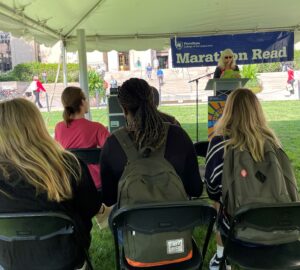
Janet Lyon, an associate professor of English and an affiliate of the Department of Women’s Gender and Sexuality Studies, read an excerpt of Silent Spring as her students sat in the crowd and encouraged her.
“It’s a really cool collective participation in textuality,” Lyon stated. “As an English professor, I just love the idea of a voice being passed from one student to the next around a central text. It’s a lovely experience.”
Having participated in previous years’ Marathon Reads, Lyon considers it to be a “terrific event,” and she encouraged her own students—many of whom were unaware about the opportunity—to register and participate.
“I really like the theme, especially reintroducing people to Silent Spring, which I think has been lost in generations as a primary text,” Lyon said. “It’s a perfect day for it, the doughnuts are delicious, the microphone is excellent, and the T-shirts are cute.”
For students who have never heard about the Marathon Read, Morrisson advised they shouldn’t think of the event as a lecture or classroom enrichment. Rather, he said people should come because it’s a fun event—like “a mini-party around pizza and books.”
Morrisson noted that some students “get into little silos” within their academic area of interest without branching out and taking advantage of the opportunities provided by other departments and academic colleges.
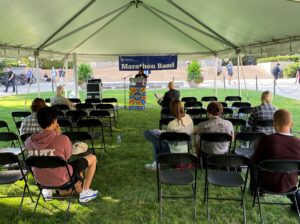
“The event was created to bring a sense of community into the humanities and liberal arts and reach out to students across campus who might be passing in front of the library,” Morrisson said. “It gives a sense that there’s a lot to be offered by reading some of these fantastic books, and it’s also about the experience of hearing the books read aloud as a community-building event.”


Penn State students and faculty united on the Pattee Mall on Sept. 15, taking the opportunity to appreciate sustainability-themed literature and consider the environmental implications of climate change, for the first in-person Marathon Read event since the coronavirus pandemic began.
This year marked not only a return to Marathon Read’s usual in-person format, but also its tenth anniversary.
The day began at 10 a.m. with Rachel Carson’s revolutionary 1962 Silent Spring, a foundational text in the environmental movement. Over the next 12 hours, community volunteers read from a variety of works by an array of literary masterminds, including K.A. Hays’s “Anthropocene Lullaby” and Ross Gay’s “Catalog of Unabashed Gratitude.”
Event organizers selected “The Pursuit of Sustainability” as this year’s theme. The readings were carefully curated to explore the “complex challenges of climate change and its effects on environments, economies, and cultures,” according to the 2022 Marathon Read poster that greeted event attendees.
Participants from Penn State and the larger Centre County community were invited to read for five-minute intervals. Special guests like philanthropist Sue Paterno and English department head Mark Morrisson also joined throughout the day to put a voice to the selected sustainability pieces.
Morrisson said he’s attended every Marathon Read event since 2012 when English professor Chris Reed and Comparative Literature professor Eric Hayot formed the initiative.
He explained he’s been supportive of the event since it started and sees Marathon Read as “a presence” on the lawn in front of the College of the Liberal Arts, English department, and library that positively promotes literature to the general community.

Joe Bueter, a Penn State professor of English and Marathon Read organizer, said the event is about putting “engaging texts,” which this year focused on the challenges and the rewards of sustainability, in front of the public.
“It was strange doing it two years over Zoom, so I was really happy with the possibility of doing it outdoors again where it does a better job of touching people during their day as they’re walking past and can stop, relax, and hopefully—ideally—just absorb a little bit of the literature we’re reading at the time,” Bueter shared.
With this year’s sustainability theme, Bueter commented it makes sense to hold the event in an outdoor environment so people can “see what we’re trying to preserve.” He said he hopes this year’s theme encourages students to consider how to incorporate sustainability efforts into their day-to-day lives.
Many students and community members participated in this year’s Marathon Read. Mara McKeon, a second-year English and public relations student, learned about the event through her social media internship with the Digital English Studios and was excited at the opportunity to volunteer and participate as a reader.
McKeon expressed enthusiasm for the sustainability theme, as climate change discourse has permeated all levels of society, especially in political and institutional spheres.
“I think it’s a good topic to bring to light, [especially] through the more lighthearted way of reading—not a [traditional] lecture setting,” McKeon added.
First-year finance student Luke Hamaty decided to volunteer for a one-hour shift at Marathon Read because he heard it would be an engaging community event and a great opportunity to get involved in his first semester at Penn State.
During his shift, Hamaty worked at the sign-in table helping readers prepare for their time slots and as a timer aiding with transitioning readers after their five minutes were up. His involvement with the event has provided him with a new perspective, he said, as well as insight into the ways he can serve the Penn State community.
Gabrielle Leach, co-chair for Penn State’s Student Sustainability Advisory Council and a third-year student majoring in environmental resource management, noted that events “rooted in science and literature” provide attendees with “a great stepping stone” to learn more about sustainability while also dispelling previous misinformation campaigns.
“There’s a place for everyone in the climate change movement, in sustainability, and in being environmental,” Leach said. “It doesn’t matter if you’re majoring in business or engineering or something in the liberal arts. Whatever you are, there’s always some facet of your degree that’s going to connect back to sustainability and the climate change movement.”
Alex Warren, a first-year student majoring in landscape architecture, decided to volunteer as a time keeper at Marathon Read because she’s deeply interested in sustainability and is trying to learn about the environment.

“I’m also dyslexic, so it’s a very good opportunity to see people read,” Warren explained. “I just like listening to the different voices as they read the same book.”
Sarah Corrigan, a second-year advertising student, read an excerpt from Rachel Carson’s Silent Spring during her time slot. She admitted she didn’t know what the event entailed when she signed up as a reader, but the experience pleasantly surprised her.
“When I showed up and saw that people were reading aloud, I got a little nervous, and I wasn’t sure if I was actually going to show up,” Corrigan commented. “But I decided to, and it was a really good [decision] because it’s important to have experience public speaking about something you’re passionate about, and I’m passionate about sustainability.”
Alysha Ulrich, co-chair for Penn State’s Student Sustainability Advisory Council and fourth-year earth science and policy student, suggested people should attend sustainability-themed events with the intention of learning about the topic, rather than trying to discern whether they believe in climate change and environmental matters.
She said events like Marathon Read are primarily educational in nature—not political—although mass participation in such events can sway decisions by institutions and policy makers.
“Trying to add to the voice and the momentum surrounding sustainability conversations is really important,” she remarked.
The Penn State College of the Liberal Arts designated “Moments of Change: Creating a Livable Planet” as their 2022-23 academic theme that would focus on sustainability and the efforts of the Liberal Arts Sustainability Council at the University Park campus. The 2022 Marathon Read is one component of the year-long initiative designed to start conversations about current and future sustainability needs.
Lara Fowler, the interim chief sustainability officer and director of the Penn State Sustainability Institute, said she supported the Marathon Read topic because it reframes the sustainability conversation amid a turbulent culture of environmental discourse.
Fowler said the environmentally focused narratives commonly distributed by mass media prompt people to adopt negative mindsets about the environment and climate. She explained how hearing misinformation and ill-framed news causes some people who would typically participate in sustainability action to feel helpless about their potential contributions.

“The narrative needs to be one of hope, and ‘we are,’ and we can do this,” Fowler added. “We may feel like we’re just one state in a tiny microcosm of the whole world, but we’re important in terms of what we can do in that space we have. That’s where the energy, the drive, the motivation, and the engagement of students [is] important. That driving voice can be a driver for change here locally, but with that snowball effect in lots of other spaces.”
Fowler suggested people need to consider the “vision” for what they want their communities to be, and she sees literature as one way to envision those possibilities and pinpoint ways to transform dreams into reality.
“Books, literature, and writing allow us to transport ourselves out of the here and now and see a different world—to imagine a different world,” Fowler said. “There’s a tremendous power in telling stories because behind the scenes, there’s such good work happening locally, regionally across Appalachia, nationally and even internationally, but those are often the stories that go untold or get less [attention].”
Morrisson expressed similar sentiments about the power and influence of this year’s literary selections—especially Silent Spring, which he teaches in his chemistry and literature course.
“For me, the text is a beautiful reminder of not only what we can do to the planet, but what we can also do to not harm the planet because there’s a lot of positive alternatives in that book,” Morrisson shared. “With all the talk of sustainability these days, the sustainability movement kind of owes something to this book. So, it just felt important to stand out there and read it and be a part of that community of readers.”

Janet Lyon, an associate professor of English and an affiliate of the Department of Women’s Gender and Sexuality Studies, read an excerpt of Silent Spring as her students sat in the crowd and encouraged her.
“It’s a really cool collective participation in textuality,” Lyon stated. “As an English professor, I just love the idea of a voice being passed from one student to the next around a central text. It’s a lovely experience.”
Having participated in previous years’ Marathon Reads, Lyon considers it to be a “terrific event,” and she encouraged her own students—many of whom were unaware about the opportunity—to register and participate.
“I really like the theme, especially reintroducing people to Silent Spring, which I think has been lost in generations as a primary text,” Lyon said. “It’s a perfect day for it, the doughnuts are delicious, the microphone is excellent, and the T-shirts are cute.”
For students who have never heard about the Marathon Read, Morrisson advised they shouldn’t think of the event as a lecture or classroom enrichment. Rather, he said people should come because it’s a fun event—like “a mini-party around pizza and books.”
Morrisson noted that some students “get into little silos” within their academic area of interest without branching out and taking advantage of the opportunities provided by other departments and academic colleges.

“The event was created to bring a sense of community into the humanities and liberal arts and reach out to students across campus who might be passing in front of the library,” Morrisson said. “It gives a sense that there’s a lot to be offered by reading some of these fantastic books, and it’s also about the experience of hearing the books read aloud as a community-building event.”